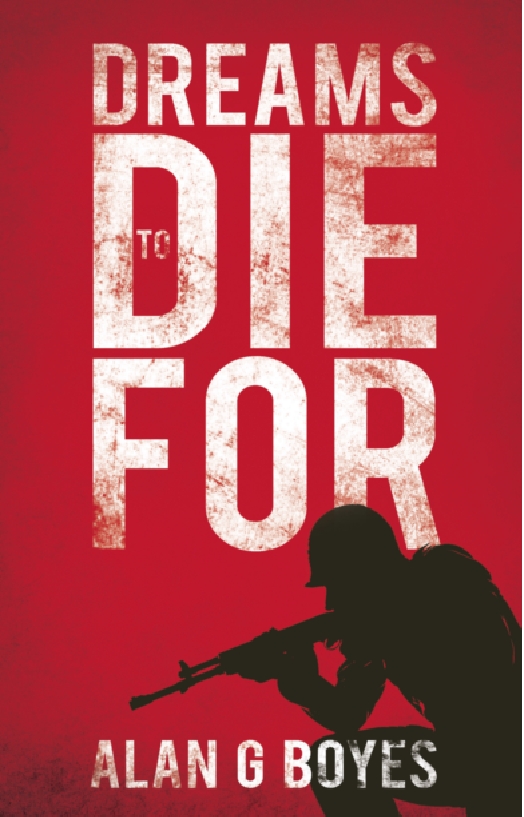Dreams to Die For
Authors: Alan G Boyes


Alan G Boyes
Copyright © 2014 Alan G Boyes
The moral right of the author has been asserted.
Apart from any fair dealing for the purposes of research or private study,
or criticism or review, as permitted under the Copyright, Designs and Patents
Act 1988, this publication may only be reproduced, stored or transmitted, in
any form or by any means, with the prior permission in writing of the
publishers, or in the case of reprographic reproduction in accordance with
the terms of licences issued by the Copyright Licensing Agency. Enquiries
concerning reproduction outside those terms should be sent to the publishers.
This book is a work of fiction. Names, characters, businesses, places and events
are either the product of the author's imagination or are used fictitiously and any
resemblance to real persons, living or dead, is purely coincidental.
Matador®
9 Priory Business Park
Kibworth Beauchamp
Leicestershire LE8 0RX, UK
Tel: (+44) 116 279 2299
Fax: (+44) 116 279 2277
Email: [email protected]
Web: www.troubador.co.uk/matador
ISBN 978 1783067 947
British Library Cataloguing in Publication Data.
A catalogue record for this book is available from the British Library.
Matador®
is an imprint of Troubador Publishing Ltd
Converted to eBook by
EasyEPUB
Firstly, and most importantly, my thanks are to my family who have given me immense support and encouragement to fulfil my ambition of writing a novel. I must also thank those who inspired me to write this story: the numerous victims of crime that I had the privilege to meet and whose courage in overcoming adversity is humbling; and also to those perpetrators of crime who provided me with a brief insight into their own ambitions and motivations. My publishers have throughout given me invaluable help, expertise and advice and, lastly, to my springer spaniel whose antics, behaviour and character I have unashamedly drawn upon for certain passages in the book!
I must also thank the following for permitting their copyrighted work to be reproduced:
In Dreams
Words and Music by Roy Orbison
Copyright © 1963 (Renewed 1991) BARBARA ORBISON MUSIC COMPANY, ORBI-LEE MUSIC, R-KEY DARKUS MUSIC and SONY/ATV MUSIC PUBLISHING LLC
All Rights on behalf of SONY/ATV MUSIC PUBLISHING LLC Administered by SONY/ATV MUSIC PUBLISHING LLC, 8 Music Square West, Nashville, TN 37203
All Rights Reserved Used by Permission
Reproduced by Permission of Hal Leonard Corporation
Quoich Dam Scheme (Cross Section)
Reproduced by kind permission of
Water Power
magazine
“
A candy-colored clown they call the sandman
”

Yasmin Hasan's family were Sunni, like Saddam Hussein, but her parents never liked nor openly supported the autocratic leader of Iraq. They never opposed him either. Her mother and father, and their parents before them, had been born and raised within Baghdad's ancient city walls and learnt that to survive and prosper it was necessary to adapt to the demands and turbulence of the changing ruling forces which had governed their lives. They had witnessed the bloodshed of the overthrow of the old King Faisal II and the murder of the royal family in 1958, dutifully turning out to join the gruesome parade of their bodies as they were dragged along the soiled and bloodstained streets of the new Republic. Ten years later they mingled with the crowds lining the same streets to cheer the success of the bloodless coup led by General Ahmed Hassan al-Bakr that brought to power the Arab Socialist Baa'th Party and some of his close army colleagues, including Saddam. Throughout their lifetimes Baghdad had never been a place for freedom of expression and democratic principles, and during Hussein's rule they had witnessed how even the slightest critical comment of the regime could lead to a whole family's sudden and permanent disappearance. Yasmin's family were more than content not to notice the abuses going on around them, preferring instead to take advantage of the benefits bestowed upon the minority Sunni population and to make certain that they at least appeared to be loyal citizens.
By comparison with most Middle Eastern children, Yasmin had experienced a happy childhood free of poverty, principally because of the reforms and economic progress made by Iraq under Saddam, which had enabled her father to establish a flourishing and profitable electrical business. Her parents had come from modest backgrounds and life for them was initially tough until Hussein took control and installed himself both as President and Prime Minister in July 1979. Saddam actively fostered the modernisation of the Iraqi economy and protected it by creating a strong, often brutal, security force to prevent the country from returning to factional warfare. It also served to ensure no one threatened to overthrow him. The revenues from the newly nationalised Iraqi oil industry, swollen by massive increases in the world prices, had provided social services and public health systems, including free hospitalisation, which were unprecedented among Middle Eastern countries. There was universal free schooling up to the highest education levels for both boys and girls and Yasmin was but one of hundreds of thousands of children who benefited from it, gaining an excellent degree in chemistry from Baghdad University before undertaking a postgraduate course at the University of Birmingham in England.
During her year in Britain, the crisis between Saddam and the West worsened and when she returned home she found a nervous populace, confused by the West's attitude towards an Arab country that had embraced very many western values, and a city wondering what its future may hold. Yasmin was determined to assist the country of her birth and she quickly obtained employment in a genetic research establishment on the outskirts of the city.
On the first day of the invasion in 2003, the âShock and Awe' targeted bombing of her native city blasted the laboratory where she worked to rubble. From then on life for Yasmin and her parents rapidly descended into a daily ordeal of avoiding the coalition bombs and missiles. Her father's business collapsed, initially not from high explosives, but simply because nobody wanted luxury goods any more. Prices were rocketing and money was needed to buy bread and other basic items that kept a person alive. When the Americans entered Baghdad and Hussein fled, Yasmin's parents did not celebrate but neither were they dismayed. They were not political and their prime concern now, like most of their countrymen, was how quickly the city, and particularly their business, could start functioning again. Anticipation turned to frustration and then to anger when over the weeks it became clear that the forces that had almost destroyed their city had no intention, nor the resources, to repair even the most basic infrastructure. Day upon day passed with no electricity, no water and little food. Roads were impassable, buildings dangerous and all the while the resentment towards their new rulers grew. The khaki-dressed soldiers were now seen as invaders and tension rose as the general population increased its protests.
Under Saddam there had been little terrorist activity as his security forces liquidated any such opposition with ruthless efficiency, but Yasmin noticed a dangerous change of attitude growing from those like her and her family who were forced to continue to live in ruined buildings and on broken streets. Saddam's own military forces slipped quietly back into civilian life or joined the swelling numbers of the various disaffected factions who quickly armed themselves with weapons from their own hastily deserted military compounds. The next few months were both terrible and frightening for Yasmin. She watched as bombs and mortars, from one side or the other, rained down upon the street where she lived. She witnessed several of her friends die in these attacks, their limbs twisted and torn by shards of red hot metal and saw the spattered trails of dark red blood drying on the white concrete walls acting as a daily reminder of where they had fallen.
“Why has this happened? What harm have we and our friends ever caused to Saddam or America to bring about this carnage?” She angrily questioned her father, after her oldest friend had her leg blown off from the blast of a car bomb. Her father could not answer. He did not understand either. He had believed the coalition forces would quickly restore order and provide safety as well as renewing the essential services, but it had not happened. He was a disillusioned and a deeply saddened man who often sat for hours in his empty shop gazing through tired eyes at the street outside and the destruction around him. Slowly Yasmin's fear and grief turned to anger and resentment.
Within a few months Haifa Street â Grenade Alley, as the Americans later nicknamed it â had suffered so many street bombings and helicopter attacks that hardly a building remained intact. Her father's shop was so severely damaged it had to be boarded up, and Yasmin and her family were confined to the small flat at the rear of the premises. The intensity of the attacks escalated and tragedy struck Yasmin's family in September 2004. The Shia-dominated new Iraq army, intent on driving out the Sunni population of the street, claimed that the area was occupied by insurgents and, bolstered by coalition forces, moved in to cleanse the street of its inhabitants. In the midst of a particularly fierce gun battle raging elsewhere along the dusty and now empty road, a trigger-happy American soldier suddenly burst through the Hasan's living room door, firing his machine gun in all directions. Yasmin witnessed her parents being propelled to the floor as the impact of a spray of high-powered bullets smashed and ripped into their flesh, leaving only a horrible crimson stain spreading across the sofa where a few moments earlier they had sat reading books in the dim light. Too late the soldier realised that the two corpses lying on the carpet were unarmed civilians. Yasmin came running through from the bathroom and screamed. The soldier ran. Cradling their bodies, the twenty seven year-old Yasmin screamed and vowed to avenge their deaths. Frustration and resentment instantly turned to hatred.
